Even if you don’t trade Bitcoins and are not sure how stocks work, there is still a chance that you might have used some sort of FinTech services like, mobile payments or online banking solutions. In fact, the adoption of fintech globally reached 33% in 2017 (compared to 16% in 2015). In this article, we’ll discuss the know-how of starting a Fintech company, what could be the possible barriers on the way, how to navigate safely through and establish your own successful Fintech company.
“You have to, to serve these markets, re-imagine how money can be managed and moved because there’s going to be more change in the next five years in financial services than happened in the past 30.”
– Dan Schulman, CEO PayPal
Thus, there is absolutely no denying the fact that technologies will continue to invade the age-old financial industry. Riding on the fintech bandwagon, many millennials and innovators have reinvented their businesses and made a hefty profit in the transition.
But, how do you even start?
With tons of startups entering the market every month and billion-dollar giants running the show, it can be quite hard to get your piece of the pie.
The 5 Best Fintech Startups and Their Recipe for Success
What’s better than to learn from those who have already made it big, so before delving into the recipe for success, let’s first look at some trendsetters in the current fintech setting, and what has been their secret ingredient.
1. Stripe
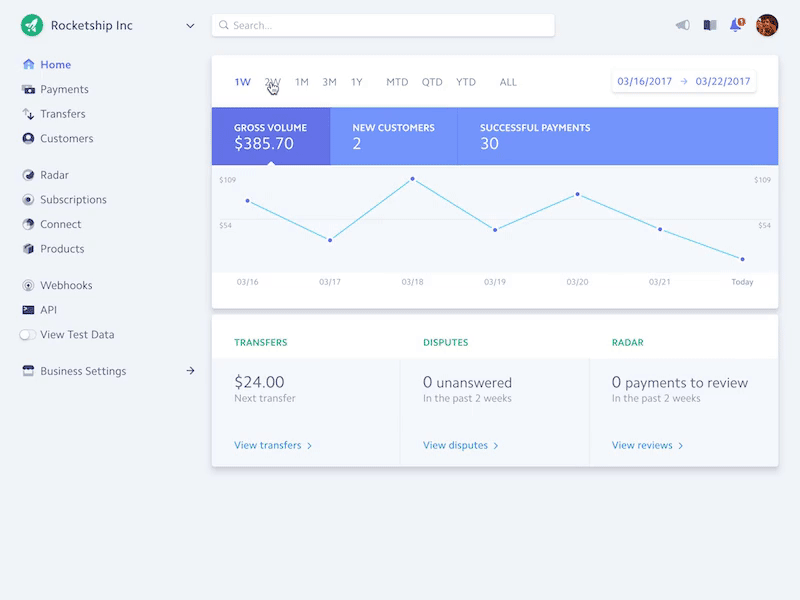
Courtesy: dribbble.com
- X-Factor:
- Ease of Integration
- Tools
- Competitive and Crystal Clear Pricing
- Customized
- Better Customer Support
- Niche: Online Payment Services
- Funding:
- Raised a total of $685M in 9 rounds.
- Now valued at $20B.
Stripe’s impeccable functionality and meticulously designed API has helped create the best possible product for the consumers. It has undoubtedly become a one-stop destination for the creation of subscription services, crowd-funding platforms, an e-commerce store and more. This tech company has been able to build an economic infrastructure for the internet by helping out businesses of almost every size. It combines a payment platform with applications that put revenue data at the heart of business operations.
2. Robinhood

Courtesy: dribbble.com
- X-Factor:
- Laser focus on target market (millennials)
- Viral marketing strategies
- Clutter-free interface
- Niche: Trading and Investments
- Funding:
- Raised a total of $539M in 5 Rounds
- Now valued at $5.6B
It could easily be touted as the top fintech company of this year. In order to keep the fees down, the company abstains from opening storefronts and renders no additional tools. Aptly named after the popular fictional character, it is helping the less economically privileged grow by using and betting on rich people’s money. The fintech app has eliminated all brokerage fees that have traditionally been associated with initiating a buy or sell. It earns money through its Robinhood Gold accounts for premium members and by collecting interest from cash holdings and stocks just like a bank. The app is clutter-free and straight-forward, making it easy to use for everyone.
3. Lu.com/Lufax 
- X-Factor:
- Broad product offering
- Diverse liquidity avenues
- Niche: Peer-to-Peer Lending and Financing platform
- Funding:
- Raised $1.7B in 2 rounds of funding
- Now valued at approx. $10B
Lufax has grown to become China’s largest fintech company in less than four years. It is considered to be China’s most innovative non-SOE financial institution. The number of registered users on Lufax surpassed 14 Million recently. Lufax takes complete advantage of the latest big data and IT offerings, and clouts the most advanced risk assessment models and risk control systems.
4. Paytm
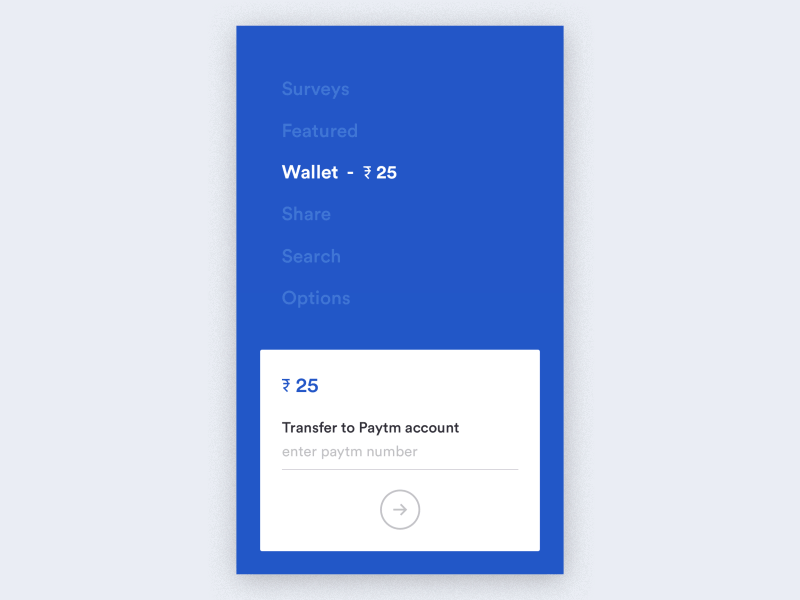
Courtesy: dribbble.com/paytm
- X-Factor:
- Extremely high brand awareness
- Strong marketing campaigns
- Word of mouth
- Strong investments from big-wigs
- Niche: Online payments
- Funding:
- Raised over $2.2B in 4 funding rounds.
- Now valued at approx. $15B.
Touted as India’s largest mobile commerce platform – it has 80 Million active monthly users and processes around 5 million transactions every day. Paytm tries to maintain an open culture where everyone is a hands-on contributor and feels comfortable sharing ideas and opinions. Paytm’s team spends hours designing each new feature and obsesses about the smallest of details.
Paytm’s approach is quite simple – To design something they’d use.
5. Klarna
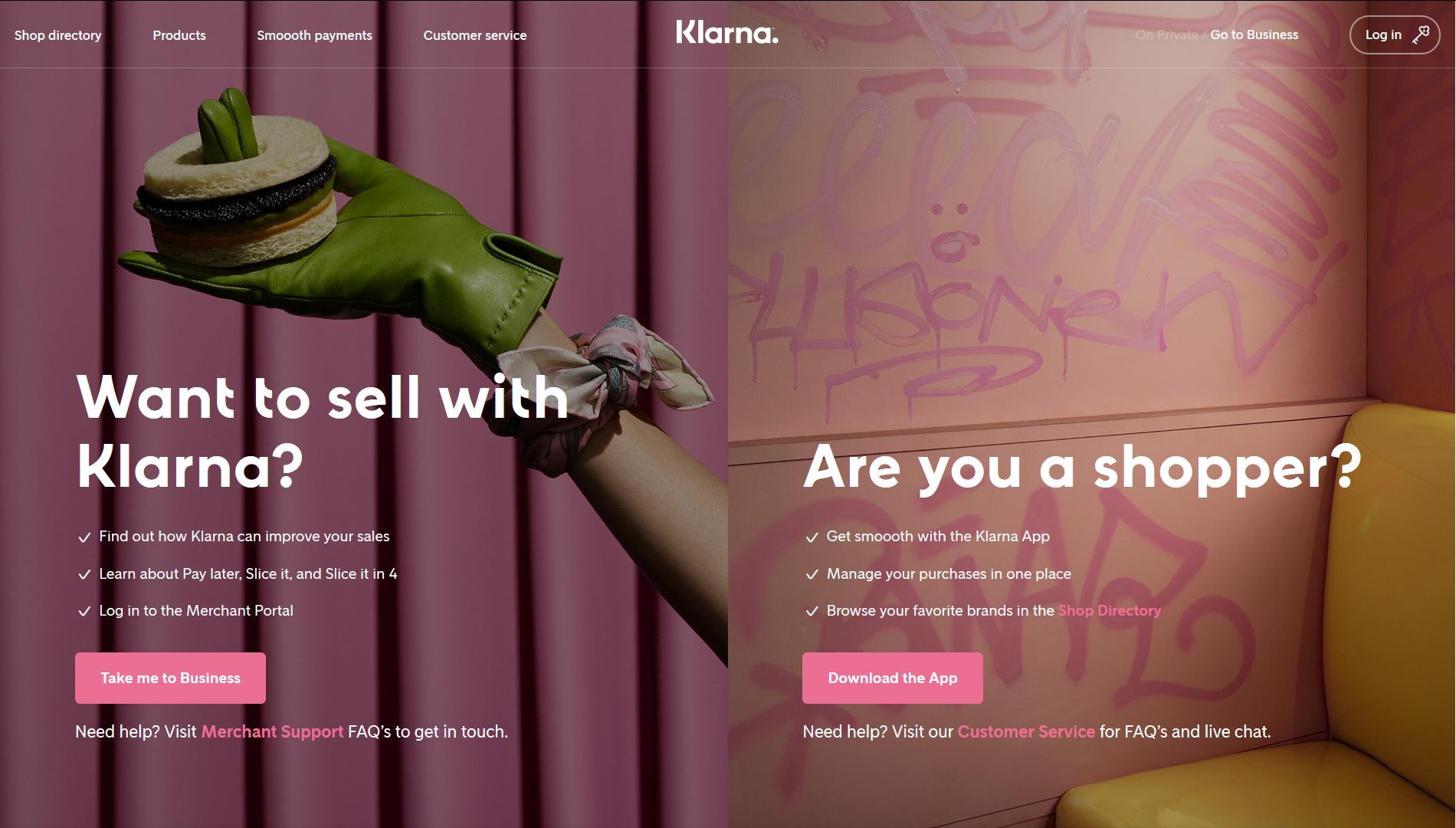
Source: klarna.com
- X-Factor: Business Model
- Niche: Online Payments
- Funding:
- Raised $681.7M in 13 funding rounds
- Now valued at north of $2.5B
According to its CEO, Klarna’s mission remains the same, even after 12 years of its formation – To make paying as simple, safe and above all, as smooth as possible.
This simple vision has helped Klarna become one of the largest banks of Europe.
Klarna’s pay later policy has proven to be a tremendous success across Europe. Try it first, pay later, lets users pay 14 or 30 days after delivery depending on the store. Besides, there is also an option of paying in installments for its users.
They have a user base of almost 60 Million and has some 90,000 registered merchants on their platform.
So, what is it specifically that differentiates these exceptional startups from the rest of the crowd?
You might have observed that some of the words used to describe all of the listed products were – “simple” or “easy.” This can’t just be a coincidence.
Simplicity and ease-of-use are powerful differentiators that can separate any product from their competitors. The simplicity of these products gave them a competitive advantage over other established giants.
Mentioned below are the 7 steps you need to consider in order to establish a successful Financial Technology startup.
STEP 1: Identify your Niche
Fintech is a broad term and has a lot of dimensions to it. The classification of Fintech really depends on various circumstances.
It may refer to a specific set of start-ups and companies, or it may apply to initiatives enabled by technological innovations that contribute to the development of the financial segment.
There are many domains in fintech to consider, here are some of them:
- Fund Movement, or transactions by giving or receiving payments.
- Currency
- Payment Solution
- Remittances
- Fund Placement, or the financing of planned or unplanned financial regulations.
- Saving
- Investing
- Borrowing
- Alternative Financing
- Data Management, to get insights for improving decision making
- Financial Management Tools
- Research and Data
For starting a fintech company, one must be crystal clear of the target market and the problem they are looking to address. Besides choosing a domain, your product should cater to a specific audience, e.g., a country, a state, a city or a particular demographic. However, it is always better to launch your startup locally first and expand to the global market later if needed.
STEP 2: Know the Regulations
The banking and finance industries are highly regulated ones’ and for obvious reasons. The regulations are why financial service industries can be tough to break into. Several laws have been put to place to ensure that these sectors are protected from frauds. Also, these regulations can immensely vary depending on the country, state or region you want to operate in.
The arrival of Fintech has ushered in new ways of handling and making money, and thus, have created a grey area for regulations. This has been drawing the attention of lawmakers.
So, whatever domain one wishes to venture in, it is of vital importance to thoroughly understand the regulatory measures that apply according to the demographics and geography.
STEP 3: Discover your Edge
Every unique product or innovation that has been able to disrupt a sector successfully has always been the one that has done something differently.
There couldn’t be a better example for this scenario than Robinhood. With their unique business strategy and viral marketing campaigns, they were able to successfully disrupt the trading and investments domain. Their distinctive business offering, like charging zero commission proved to be an instant hit amongst millennials with limited pocket.
The fintech industry is getting crowded. Many innovations are already underway. Still, a critical entrepreneurial question to ask is if your product/venture will be able to offer something unique and of high importance.
The danger for startups is to become a “me too.” If there is already an entity that is established and doing well in your niche, then you should divert your focus to something new and innovative.
Thus, it is vital for new-age fintech startups to focus their attention towards developing a product that offers a service or a feature that is exclusive to them. There needs to be some sort of nuance that your solution must provide.
This distinction would serve as the disruption that you might have been looking for.
STEP 4: Hire the Right Talent along with the Right Tech Stack
• Hiring the right talent
A successful enterprise is made from its people. Therefore, hiring crème-de la-crème from amongst the crowd is of vital importance. If your city has a limited talent pool, then attracting good talent becomes quite tricky.
In such cases, the best decision for a startup would be to hire a software development team offshore (consider India!). This not only cuts significant costs for up-and-coming startups, but also provides a solid team of specialists with specific domain knowledge and relevant experience.
If you are on the lookout for creating a great product and are considering hiring a software development company, then look no further, we have compiled a list of the best financial app development companies.
• Choosing the right tech stack
It is must for every fintech product to have a customized software. No decent startup relies on third-party CMSs or frameworks to handle their transactions. Additionally, no ready-made solution can match the performance capabilities of a custom designed software.
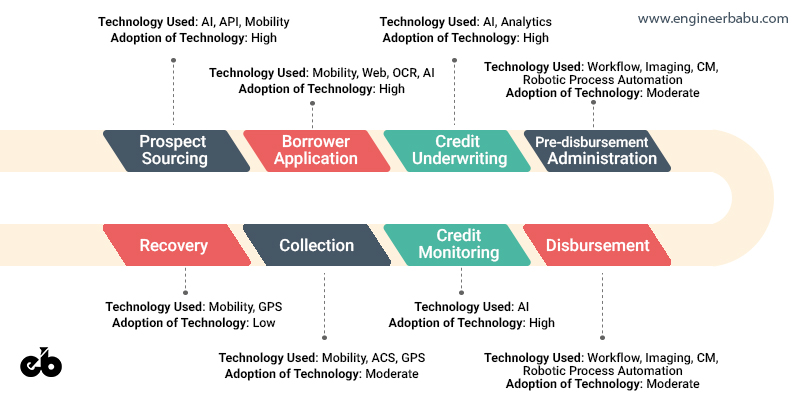
With finance, comes along the risk of data breach. Therefore, data safety is one of the most critical aspects of Fintech App Development.
Every startup needs to ensure that their product is secure and all the sensitive data is encrypted and stored in the cloud.
Recommended Read: How Much does Mobile App Development Cost?
Step 5: Start by creating an MVP (Minimum Viable Product)
I strongly recommend starting with a Minimum Viable Product first.
For beginners, an MVP is a development technique in which a new product or website is developed with just enough features to suffice for the early users of the product. The final product, with all the elements, is only designed and developed once the feedback is received from the initial users.
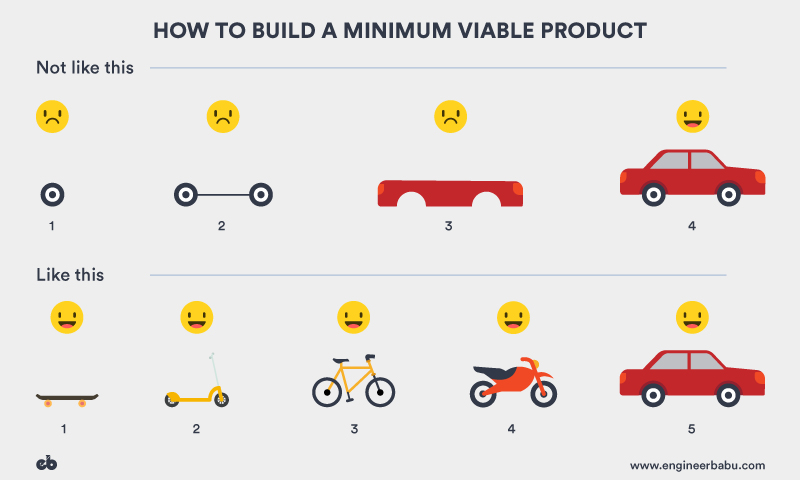
There are numerous advantages of following this process, primarily:
1. Cheaper: An MVP saves you a considerable amount of investment because you’re not required to develop extra functionalities that may have compromised the product anyway. These cost saving are essential because you don’t know for sure whether the consumers will like the product. Through MVP you can test the waters and then dive into the deeper end of the pool.
2. Effective: Using the MVP approach means you end up with only those features that you require the most, so, there is comparatively less façade, and your product turns out cleaner and simpler.
3. Faster: Another benefit of an MVP is the Speed of Development. You’re not trying to create a perfect product right away; it serves as a platform to implement the idea, study its use, make amends and then proceed further. This makes the entire process a whole lot faster and easier.
4. Reduces risk: A startup with a Minimum Viable Product is more likely to receive funding from the investors, this is because an MVP gives you an opportunity to test the waters without directly building the final product. It allows developers to test the viability of your product amongst the target audience without requiring huge investments.
The lower the risk of the investment not paying off, the more likely investors are to fund your idea.
Step 6: Get Funded
Starting a fintech company is a costly affair. Making an incredible product requires talent, and talent isn’t cheap. As traditional organizations are trying to acquire fintech talent for themselves, startups would inevitably face competition in hiring. If your venture isn’t looking to partner with professionals who can create the entire product range, then stay prepared to shell out a reasonable amount for talent.
Now, if you don’t have deep pockets, it becomes quite difficult to stay afloat in this volatile domain. Thus getting an investor onboard becomes essential to not compromise on the product quality.
What entices Investors?
With the current wave of excitement around fintech. The global venture capital investments have crossed almost $17B. This, however, could also be a bane for early age startups, because the competition for funding is snowballing exponentially. VCs are getting more and more selective, and are seeking out companies with truly game-changing offerings.
Thus, it is required to make your value proposition more and more enticing.
Step 7: Build Partnerships
It is as essential for up-and-coming fintech startups to develop alliances with relevant institutions, as is getting funded.
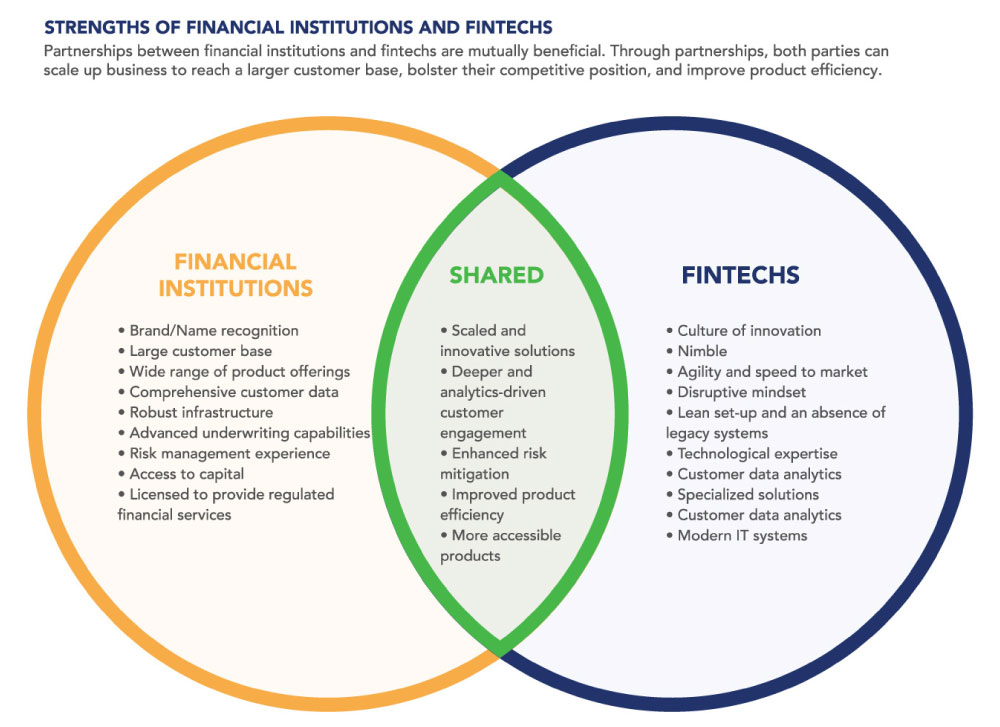
Image Courtesy: centerforfinancialinclusion.org
Partnering is an excellent approach to build muscle in innovation and transformation. In which you can learn at minimal cost and minimum risk. The primary reason for partnering pertaining to this specific domain is, ‘Credibility.’
It could be hard for users to trust an emerging entity, and that too in such a volatile domain. Thus, when you are associated with a relevant name, it becomes comparatively easier to sail through those hurdles. Financial institutions also bring along a large customer base and comprehensive customer data.
Thus partnering can provide a considerable boost to startups and together they could improve product efficiency and build highly accessible products.
Wrapping Up
Fintech may not be the easiest industry to target. With all the pitfalls in consideration – It takes sweat, time and effort to create a successful fintech company. It demands expertise, creativity, and honestly, a lot of grit to launch a startup in such a frivolous and competitive domain.
There are numerous opinions highlighting the supposed discord between the slow-evolving realm of finance and the highly disrupting world of technology. The pressure on tech companies to deliver huge results rapidly is immense.
Still, if you believe that you will be able to solve financial issues for your users through innovative means, go ahead. You will also need the right people by your side. A team with strong technical skills and impeccable domain expertise will definitely help in building something great.
Just be shrewd with how you do it.
After all,
Fortune favors the bold.
From helping organizations like BankOpen to dozens of startups worldwide, we at EngineerBabu have a track record of building highly successful fintech products.
And several have even gotten funded!
That’s precisely why we understand the ins’ and outs’ of this realm and how to scale a business to tremendous heights.
So, If you are on the lookout for solid domain expertise and a trusted name in the industry, contact us right away.

